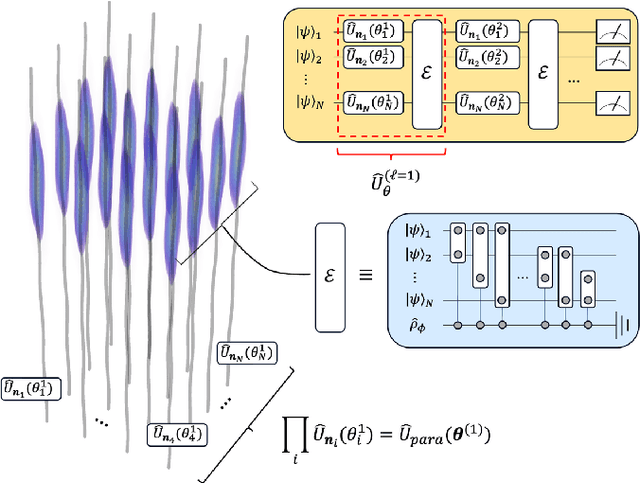Philip A. LeMaitre
A Universal Quantum Computer From Relativistic Motion
Oct 31, 2024

Abstract:We present an explicit construction of a relativistic quantum computing architecture using a variational quantum circuit approach that is shown to allow for universal quantum computing. The variational quantum circuit consists of tunable single-qubit rotations and entangling gates that are implemented successively. The single qubit rotations are parameterized by the proper time intervals of the qubits' trajectories and can be tuned by varying their relativistic motion in spacetime. The entangling layer is mediated by a relativistic quantum field instead of through direct coupling between the qubits. Within this setting, we give a prescription for how to use quantum field-mediated entanglement and manipulation of the relativistic motion of qubits to obtain a universal gate set, for which compact non-perturbative expressions that are valid for general spacetimes are also obtained. We also derive a lower bound on the channel fidelity that shows the existence of parameter regimes in which all entangling operations are effectively unitary, despite the noise generated from the presence of a mediating quantum field. Finally, we consider an explicit implementation of the quantum Fourier transform with relativistic qubits.
Multi-Excitation Projective Simulation with a Many-Body Physics Inspired Inductive Bias
Feb 29, 2024



Abstract:With the impressive progress of deep learning, applications relying on machine learning are increasingly being integrated into daily life. However, most deep learning models have an opaque, oracle-like nature making it difficult to interpret and understand their decisions. This problem led to the development of the field known as eXplainable Artificial Intelligence (XAI). One method in this field known as Projective Simulation (PS) models a chain-of-thought as a random walk of a particle on a graph with vertices that have concepts attached to them. While this description has various benefits, including the possibility of quantization, it cannot be naturally used to model thoughts that combine several concepts simultaneously. To overcome this limitation, we introduce Multi-Excitation Projective Simulation (mePS), a generalization that considers a chain-of-thought to be a random walk of several particles on a hypergraph. A definition for a dynamic hypergraph is put forward to describe the agent's training history along with applications to AI and hypergraph visualization. An inductive bias inspired by the remarkably successful few-body interaction models used in quantum many-body physics is formalized for our classical mePS framework and employed to tackle the exponential complexity associated with naive implementations of hypergraphs. We prove that our inductive bias reduces the complexity from exponential to polynomial, with the exponent representing the cutoff on how many particles can interact. We numerically apply our method to two toy environments and a more complex scenario modelling the diagnosis of a broken computer. These environments demonstrate the resource savings provided by an appropriate choice of inductive bias, as well as showcasing aspects of interpretability. A quantum model for mePS is also briefly outlined and some future directions for it are discussed.
 Add to Chrome
Add to Chrome Add to Firefox
Add to Firefox Add to Edge
Add to Edge